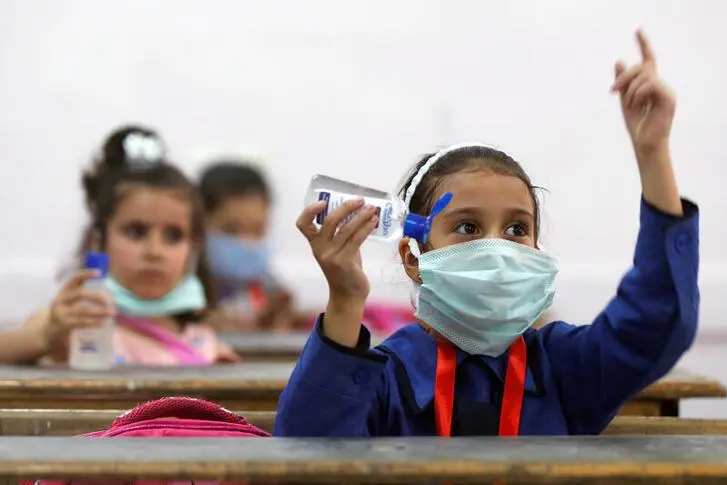PHOTO
AMMAN — Mounting calls for the return of in-class education in schools due to many students and parents’ dissatisfaction with online education have prompted the National Council for Family Affairs (NCFA) to explore alternative solutions.
When the government decided to close nurseries, it was apparent that the decision affects working mothers and the children themselves, not being able to interact with each other and learn, NCFA Secretary General Mohammed Meqdadi told The Jordan Times over the phone on Tuesday.
The council at the time gathered the entities that called for the reopening of nurseries and schools, and held a meeting with the minister of social development, highlighting the children’s growth needs and the difficulties the closure of nurseries pose to working women.
Last Tuesday, the government decided to close nurseries and schools until the end of the semester, prompting the NCFA to convene another meeting of stakeholders, who started initiatives demanding the return of students to schools, mainly the National Early Childhood Development Team, affiliated with the NCFA, and the Jordanian National Commission for Women.
Meanwhile, a number of parents launched an initiative on social media, called “It is my right to learn in school”, demanding in-class education in schools to preserve students’ physical and mental health.
“The NCFA and the initiative worked together to study and design a protocol that explains the possible damage to children if they stay at home for too long, in addition to the success rate of remote education, especially for children in kindergarten and primary grades, and its impact on a family’s work, especially mothers,” Meqdadi said.
In cooperation with the National Early Childhood Development Team, which represents governmental and non-governmental entities, as well as the UN and international entities, the NCFA and civil initiatives worked together to suggest alternatives that could resolve the issue.
“The alternatives include the gradual return of students to schools, beginning with kindergarten and early grades through to the rest of the grades, while also implementing ‘hybrid education’, where students do not have to attend five days of schools, but can alternate between remote learning and in-class learning”, Meqdadi said.
This is to reduce the number of attending students and mitigate risk of coronavirus infection, he added.
Once the protocol is finished, the NCFA will attempt to meet with the minister of education to study the possibility of implementing the solutions, while also maintaining remote education for families that can afford the time and infrastructure, the secretary general said.
Education Minister Tayseer Noaimi last Friday said that more than 70 per cent log-in the Darsak platform for remote learning, which Meqdadi said “that around 30 per cent do not log-in, and this is bordering on a large percentage of dropping out.”
“We realise that there is a direct relation between dropping out of schools and child labour, which may not be visible in the short-term, but become clearer in the long run,” Meqdadi said.
Save the Children Jordan last week issued a statement, in which it said: “The government’s decision to close nurseries and schools is a challenge to all children, especially the younger ones, in light of the importance of early education that ensure children improve their capabilities, release their energies and boost their mental their growth.”
The organisation said that early education contributes to children’s social and emotional development, and preserves their physical health, making remote education “a hindrance”.
Save the Children Jordan said it also demands reopening nurseries, kindergartens and schools, especially from the first to the third grades, while committing to the preventive measures of the Health Ministry as well as the Framework for Reopening Schools announced by UNESCO, the World Health Organisation and UNICEF.
As part of UNESCO’s COVID-19 education response, it issued a report titled “Adverse consequences of school closures”, in which it highlighted the social and economic costs of the closures, which include; interrupted learning, poor nutrition, confusion and stress for teachers, parents unprepared for distance and home schooling.
They also include high economic costs as parents might miss work to care for their children, in addition to a rise in dropout rates, which could lead to increase exposure or violence and exploitation, increasing early marriage and child labour, according to the report.
“It is my right to learn in school” and “no to school suspension” initiatives have gathered over 57,000 members on Facebook.
“Children’s most basic right is to learn, and remote education is robbing them of this right. How can a child who cannot hold a pencil right to focus remotely? Children need their school’s guidance to go through the early grades, and we will keep demanding the right of our children to learn nonstop,” social media user Nadeen Ayham wrote.
© Copyright The Jordan Times. All rights reserved. Provided by SyndiGate Media Inc. (Syndigate.info).





















